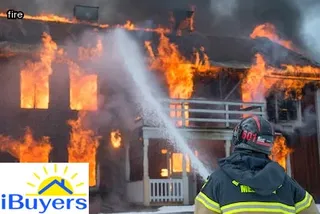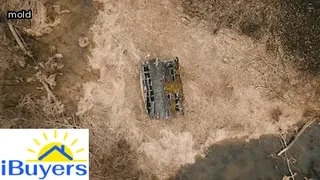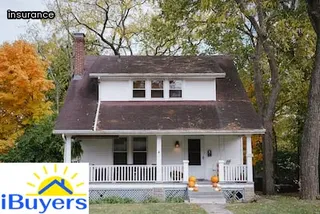Before investing in a fire-damaged house, there are several considerations to make. Firstly, it is important to thoroughly inspect the home and acquire an estimate of the repair costs.
Additionally, research into local building codes and fire regulations will ensure that any repairs or renovations adhere to the standards required. Furthermore, it is important to ensure that all insurance claims associated with the property have been settled before going through with the purchase.
Finally, consult a real estate lawyer or surveyor to verify that the property has clear title and is free from any liens or encumbrances. By keeping these factors in mind, potential buyers can be better equipped when looking at purchasing a fire-damaged home.

When it comes to buying a home, buyers should be aware of fire damage before investing. In order to identify signs of prior fire damage in houses for sale, one must look out for various warning signs from the exterior and interior of the home.
Exterior signs might include melted siding or discoloration caused by smoke, as well as damaged windows and doors. Inside the home, water stains on walls and ceilings could indicate that firefighters had to use water to put out the blaze.
In addition, buyers need to be aware that there may also be hidden damage due to smoke and soot. This includes insulation which could have been ruined due to high humidity levels after a fire has been extinguished.
Furthermore, some walls may need to be completely replaced if they were exposed to intense heat or flames. Buyers should also pay attention to any peculiar smells that could indicate that previous fires have occurred in a home before making an offer.
Although most homes will undergo inspection before being put up for sale on the market, it is still important for buyers to take all necessary precautions when looking at possible fire-damaged homes.
Buying a fire-damaged home can be a stressful process, but with the right knowledge and preparation, it doesn’t have to be. Knowing what to expect before you set out to buy or sell a home that has been damaged by fire is key to an easier experience.
When buying a fire-damaged property, it is important to understand the extent of the damage in order to know if the home is worth investing in. You should also consider getting an inspection from a professional inspector who can give you an accurate assessment of the condition of the property and any potential risks associated with it.
It is also important to research local zoning laws and regulations as well as insurance policies in order to determine how much coverage you need for your investment. When selling a fire-damaged home, it is essential to disclose all relevant information about the property to potential buyers so that they are aware of any potential safety hazards and repairs that will need to be made before they commit.
Being prepared ahead of time will ensure that both parties can have peace of mind throughout their transaction.

The potential benefits of buying a home with previous fire damage may be overlooked by some, but they are worth considering. Fire-damaged homes often come at a discounted price, so buyers can get more bang for their buck.
In addition, many states offer tax breaks or credits to encourage the purchase of homes that have been damaged by fire. Since these homes are sold as-is, buyers do not need to worry about additional costs related to repairs or renovations.
Moreover, these houses can be seen as an opportunity to customize and create a unique space tailored to the buyer’s needs and preferences. Finally, purchasing a house with fire damage is one way for homeowners to make an environmentally friendly decision since it requires less energy and resources than building new construction from scratch.
Obtaining a mortgage on a fire-damaged property can be a challenge, but with the right preparation and knowledge, it is possible. Before you begin the mortgage process, research what kind of loan you need to purchase this type of property.
You may require a special loan program or additional documentation to secure financing. Be sure to budget for repairs and any potential fees associated with the transaction in order to determine how much house you can afford.
When applying for a loan, be prepared to provide detailed information about your finances, credit history and employment status. Additionally, make sure the fire-damaged property has been properly inspected by an experienced professional before submitting an offer.
By taking these steps and having realistic expectations about buying a fire-damaged home, you will have set yourself up for success when it comes time to apply for a mortgage.

When dealing with the aftermath of a fire, there are a few key considerations to keep in mind before investing in a fire-damaged home. First and foremost, you should evaluate the extent of the damage and determine if repairs are feasible or if complete reconstruction is necessary.
It is also important to be aware that some materials may contain toxic chemicals which can pose health risks during the renovation process. Additionally, it may be beneficial to involve an experienced fire inspector who can assess structural integrity and potential safety issues in order to determine the full scope of repair work that needs to be completed.
Finally, it is advisable to consult with an insurance provider as they may be able to provide information about any special provisions related to fire damage claims. Taking these steps will help ensure you are well informed when making decisions about buying a fire-damaged home.
After a house fire, the situation can be overwhelming. It is important to take certain steps immediately to protect yourself, your family and your finances.
Start by making sure everyone is safe and out of the home. Contact your insurance company and report the damage as soon as possible.
They will send an adjuster to assess the damage and determine what coverage you have for repairs and replacement items. Ask them about any additional financial assistance that may be available such as temporary housing or transportation costs.
Make sure to document everything with photos and videos for the insurance claim. Also, contact a professional fire restoration specialist who can provide expert assessments of all damages caused by the flames, smoke, soot, and water brought in by firefighters.
They will also advise on any hazardous materials that need to be removed from your home safely. Lastly, consider hiring an attorney who specializes in property damage claims if there is a dispute over insurance coverage or other related issues arising from the fire.

When it comes to selling a house with fire damage in an as-is condition, it is important for the seller to understand all of the risks involved. Fire-damaged homes can come with extensive repair costs and legal issues that must be taken into consideration before listing the property for sale.
Depending on the location and extent of the damage, the seller may need to obtain permits and inspections from local government agencies in order to list their home in an as-is condition. Additionally, potential buyers should take caution when considering investing in a fire-damaged home due to potential structural issues or safety hazards that may not be immediately visible upon inspection.
Selling a home with fire damage requires thorough research and due diligence from both parties involved for a successful transaction.
When fire ravages a home, the insurance company is often the first point of contact for homeowners. Insurance companies can be a great help in the aftermath of a fire, but it’s important to know what to expect before starting the process of filing a claim.
Generally speaking, most homeowner policies cover both damage and liability resulting from fire. Depending on your policy, you may be able to receive coverage for repairs or replacements of damaged items, as well as additional living expenses if you are unable to stay in your home while repairs are being made.
It's also important to keep in mind that there may be limits imposed by the insurance company on certain types of losses such as replacement costs for furniture or other items destroyed by the fire. Additionally, many insurers offer special discounts for homeowners who take preventative measures such as installing smoke detectors and having regular inspections performed on their homes.
Understanding what is covered and what isn't can help ensure that you have adequate coverage when disaster strikes and provide peace of mind knowing that your insurance company will be your best friend after a home fire.

When investing in a fire-damaged home, it is essential to hire structural engineers and specialized companies for fire restoration. Structural engineers are experts in evaluating the safety and stability of buildings, ensuring that all necessary repairs are made with precision and care.
A professional engineer can identify weak points in the structure of the building, such as compromised walls or roofs, and can suggest ways to restore these areas. Specialized companies for fire restoration are also important when restoring a fire-damaged home.
These companies have experience working with smoke damage, soot accumulation, water damage caused by firefighting efforts, and other post-fire damages. They understand how to repair these issues and can help homeowners get their property back up to code quickly and safely.
When considering a property that has been through a fire, it is imperative that you seek out experienced professionals who can ensure your investment is protected and secure.
When buying a fire-damaged home, it is essential to obtain and use protective gear when cleaning up the damage. Wear a respirator mask to avoid breathing in smoke and ash particles, safety goggles to protect your eyes from smoke residue and other debris that could cause irritation, and gloves to keep hands clean from soot or moisture.
It is also important to wear long sleeves and long pants to prevent contact with hazardous materials such as asbestos. Make sure all protective clothing fits properly for maximum protection.
If you are working in an area with toxic gases or chemicals, consider investing in a full face respirator mask. In addition, wear ear plugs or headphones if possible to reduce noise exposure while cleaning up the damage caused by the fire.

Preemptive water extraction following home fires is an important step to consider when buying a fire-damaged home. This type of extraction involves removing large amounts of water from the affected area before it has had time to cause additional damage, such as mold and mildew growth.
It's also important to note that this extraction should be done soon after the fire, as standing water can cause even more damage if left too long. Before investing in a fire-damaged property, make sure you are aware of the potential for water damage and have identified who will be responsible for performing the extraction and ensuring the entire property is adequately dried.
This can help avoid costly repairs and renovations down the line.
Buying a house with fire damage can be a difficult and expensive process, but it can also be worth the investment in the end. Before investing in a home that has been damaged by a fire, it is important to understand what repairs will need to be made and how much they will cost.
It is also essential to consider additional costs such as smoke removal, structural repairs, and replacement of any items that have been destroyed by the fire. A thorough inspection of the property should be conducted by an experienced professional who can advise on potential issues related to fire damage.
Additionally, homeowners should research their insurance policy and determine if any coverage applies to covering the cost of repairs. Although investing in a fire-damaged home may seem daunting, with careful consideration and preparation, it can still be a worthwhile venture.

When it comes to buying a fire-damaged home, understanding what constitutes fire damage is key. Fire damage can vary greatly and may include structural damage, smoke and soot damage, water damage from the firefighting efforts, and more.
Structural damage includes changes to the actual infrastructure of the home due to the heat or flames from the fire. Smoke and soot damage may include discoloration of walls, ceilings, and other surfaces as a result of smoke residue.
Water damage is another common form of fire-related destruction that occurs when firefighters use large amounts of water to extinguish flames. Additionally, there may be a need for electrical work as a result of wiring or outlets damaged by heat or water from the firefighting efforts.
It’s important for buyers to understand all aspects of fire damage before investing in a property that has been affected by a blaze.
Calculating the cost of fire damage to a home can be difficult, and it's important to understand the process before investing in a fire-damaged property. Knowing how to accurately assess the extent of the damage will help ensure you make an informed decision.
Fire damage costs will typically depend on several factors, such as what items were damaged or destroyed, the size of the affected area and whether there is structural damage. An insurance company may provide an estimate for repairs, but it's important to have a home inspector look over the property and assess any potential safety hazards.
If there are hazardous materials present, like asbestos or lead paint, you'll need to factor in additional costs. The inspector should also check for hidden issues that may not be immediately visible, like water damage or smoke residue within walls or ceilings.
Finally, you should consider if any smoke odor lingers after the fire has been extinguished and factor this into your calculation as well.
Can you repair a house that caught on fire? It is possible to fix a home that has experienced a fire, but it's important to know what you're getting into before investing. Repairing a fire-damaged home can cost significantly more than buying one with no damage.
It's essential to have the property inspected by an experienced professional who can determine what type of repairs are needed and provide an estimate for the costs associated with them. In addition, research should be done to understand any existing zoning or insurance regulations that might affect the value or resale potential of the home.
A thorough understanding of the condition of the house and potential repair costs is essential in order to make an informed decision about whether or not buying a fire-damaged home is worth the investment.